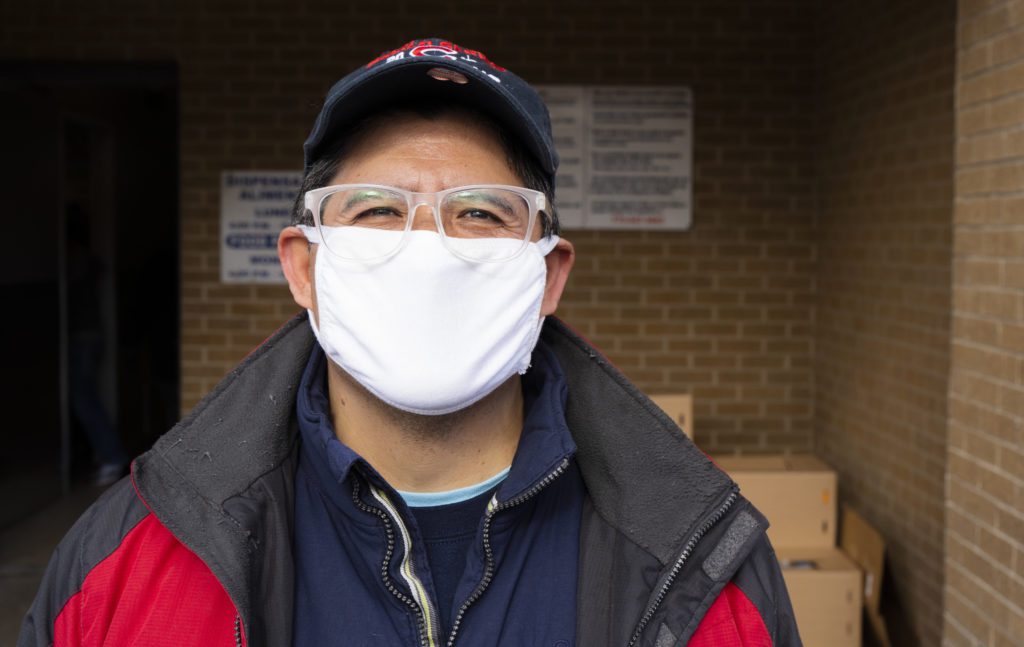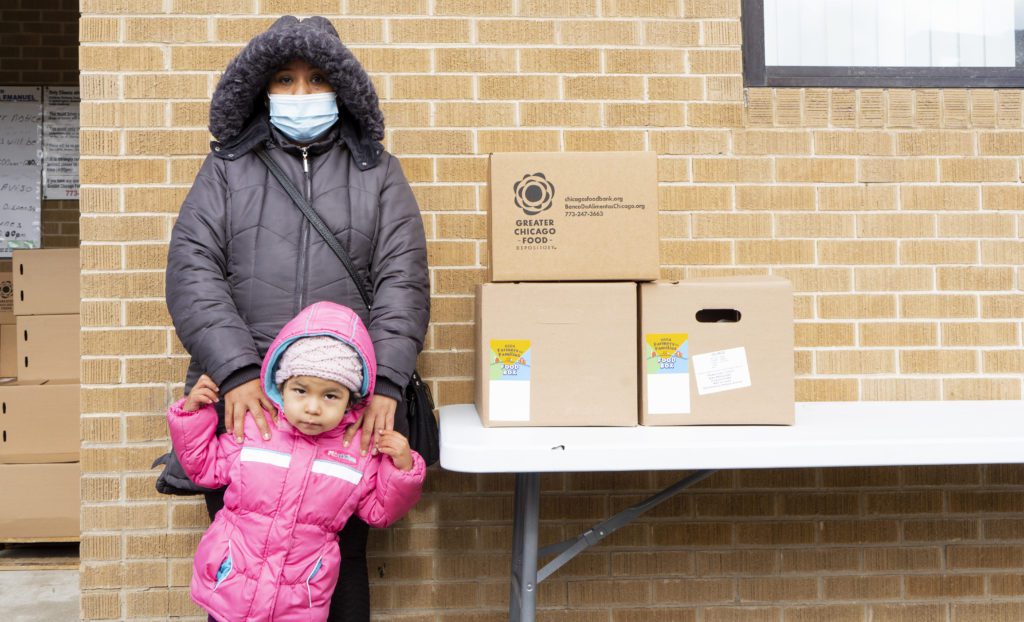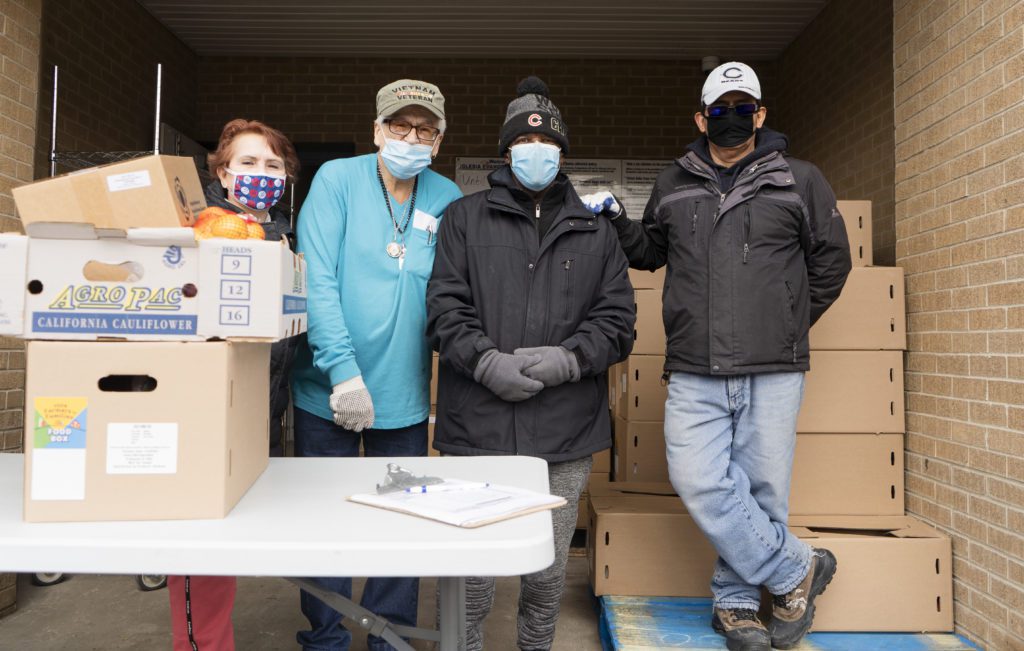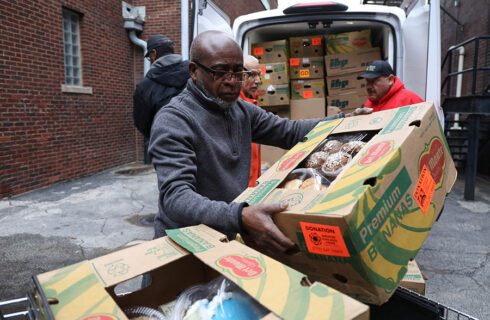On the first Monday of February – the morning after the city’s biggest snowfall in years – the Iglesia Evangelica Emanuel food pantry didn’t miss a beat.
Volunteers came twice the day before, mid-blizzard, to shovel snow off the West Armitage Avenue sidewalk. On Monday – the pantry’s weekly distribution day – some arrived as early as 6 a.m. to prepare food boxes for the hundreds of families. Because of COVID-19, the pantry operates fully outdoors and planned to do so, even with more than 9 inches of snow on the ground.
“People are hungry regardless of how cold it is,” church pastor Antonio Mariscal said as he and his team prepared to serve the first families in line. “They’ve still got to eat.”
Mariscal knows firsthand how scary COVID-19 can be. He had it himself last fall, leaving him hospitalized for five days.
But he made it through. And so have some of his volunteers who have come back after battling the illness. It hasn’t deterred them from serving their neighbors in need.
“We made a commitment, especially now, that we’re going to be open,” he said.

Pastor Antonio Mariscal
Iglesia Evangelica Emanuel is one of the recipients of the Food Depository’s latest rounds of partner grants. Twenty-six partners, primarily in Black and Latino communities who have been hardest hit by the pandemic, will split $2.6 million. This funding will be used to open new food pantries or, in Iglesia Evangelica Emanuel’s case, transform existing operations to better serve their communities.
The pantry currently feeds triple the number of households it did pre-COVID, averaging about 350 households each week. Pantry leaders attribute the increase largely to the overwhelming number of jobs lost from the pandemic. Belmont Cragin, a majority Latino neighborhood, has also been one of the communities with the state’s highest number of COVID cases. Mariscal also noted the neighborhood’s high volume of frontline workers and multigenerational households leaves its residents more vulnerable to contracting the virus and bringing it home to their families.
Hopeful to give back again soon

Maria Chavez at the Iglesia Evangelica Emanuel food pantry in Belmont Cragin.
Maria Chavez has had to make her own difficult decisions to keep her family safe. A regular volunteer for more than 20 years, Chavez decided to pause working at the pantry during the pandemic to reduce the chances of bringing the virus home.
She lives in a household with her husband, her 35-year-old daughter and 14-year-old grandson. Her daughter is currently the only one employed at a factory. Chavez, 64, worries about the danger her daughter faces every day as an essential worker.
Consistent employment is scarce in Belmont Cragin. Many of the essential workers in factories or warehouses are hired on by temporary staffing agencies. During economic downswings, they are among the first to be laid off. Many of them turn to food pantries for support until they are able to work again. A partner like Iglesia Evangelica Emanuel provides hope and nourishment to the community in times of crisis.
When Chavez is asked what this pantry means to her, her eyes light up with a smile visible even with her face mask on.
“Muy buena en todo el sentido de la palabra,” she said. It is good in every sense of the word.
“First my children, then me”
On this snowy day, Maria Luisa Diaz visited a food pantry for the first time of her life. Because she doesn’t drive, she found that the closest pantry to her was Iglesia Evangelica Emanuel. She walked there with her 3-year-old daughter, Adilene.

Maria Luisa Diaz and her daughter, Adilene, stop for groceries at the Iglesia Evangelica Emanuel food pantry.
Diaz, 40, was previously employed at a McDonald’s but recently had to leave her job after having surgery. Her biggest struggle right now is making ends meet for rent. In addition to caring for Adilene, she also has two other young children at home who have been attending school via virtual learning. She emphasized the importance of good nutrition for her kids. The food from the pantry will feed her children first.
Son lo principal, the mother said. They’re the priority.
There’s a saying in Spanish that creates momentum and helps build grit: “Ahi que echarle ganas.”
This is what Diaz responded when asked how she stays positive – you just push through.
Transforming A Community
Iglesia Evangelica’s grant award will go toward new flooring and seating to improve the pantry space once it is able to return indoors. The funding also allows the pantry to expand shelf space to store more food and purchase a vehicle to grow its booming home delivery service. The pantry delivers groceries to dozens of residents who cannot visit in person, including older adults and people with disabilities.
“All of that stuff is really just going to help us continue being open,” Mariscal said about the funding.
These pantry improvements are just the beginning of church leadership’s plans for the neighborhood.
Years ago, they purchased a nearly empty lot, at the intersection of Armitage and Lavergne avenues, with the dream of building a social service hub. They hope to eventually provide not only food, but also healthcare, childcare and other outreach to help families thrive.
That site is currently buried beneath the thick winter snow, but the dream lives on.
“Our vision is that,” Mariscal said. “Transforming a community.”

Volunteers at the Iglesia Evangelica Emanuel food pantry in Belmont Cragin.
Learn more about the Food Depository's recent round of partner grants
Share This Post



